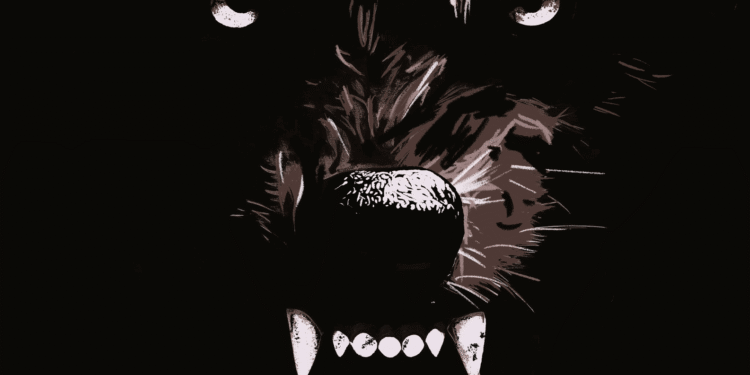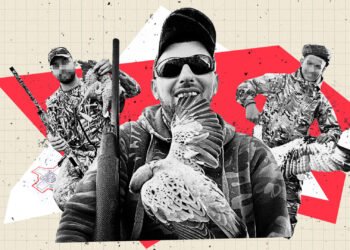This investigation reveals how Israel is using military dogs, exported from European countries, as weapons against Palestinian civilians in the occupied Palestinian territories, especially in its ongoing war on Gaza and the West Bank. It also shows that European companies specialised in training military dogs are disregarding ethical, humanitarian, and legal standards by selling these dogs to Israel.
⚠️ Trigger Warning:
This investigation contains graphic descriptions and imagery related to extreme violence, including attacks by military dogs, psychological trauma, and physical abuse. Some content may be distressing or emotionally challenging for readers. Reader’s discretion is strongly advised.
Nightmare in Balata Camp
On February 4, 2024, 42-year-old Amani and her four children in Balata refugee camp in Nablus found their morning turned into a nightmare. At 6:45 am, Israeli forces raided her home and let loose a large police dog, which gravely injured her youngest child and left the family with enduring psychological trauma.
When she heard her front door slowly opened, Amani shouted: “We are here!” to make it clear to the soldiers that they were civilians.
But this failed to prevent disaster. Moments later, a soldier let loose a large, unmuzzled dog directly into the bedroom. It pounced on her three-year-old son, Ibrahim, biting him on his lower back.
As the mother struggled to save her child, the soldiers entered the room and saw what was happening, but did not intervene to save him. “I was screaming, ‘Soldiers, you people, come on, the child’s dead, the dog has taken the child,’” she says.
Some minutes later, the soldiers finally decided to restrain the dog. But the child had already been severely injured.
A Palestinian Red Crescent ambulance crew rushed the unconscious child to Rafidia Hospital in Nablus, where he underwent emergency surgery.
Doctors said the child required 42 stitches for deep internal and external wounds and needed 21 injections to treat infection from the dog bite.
“The Dog Is Still Chasing Him… Even in His Sleep”
The attack didn’t end when the soldiers left. The door didn’t shut on the terror once the dog was pulled from the house. For three-year-old Ibrahim, the trauma remained long after the canine’s fangs were gone — etched into his flesh, his memory, and his sleep.
“Ibrahim no longer sees dogs as animals. To him, they are danger itself,” says his mother, Amani Hashash, her voice trembling as she fights back tears. “Every time he sees a dog in the street, he says, ‘Mama, that’s the one that bit me.’ I tell him, ‘Let’s go play nearby,’ but he replies, ‘No, it’ll bite me again.’”
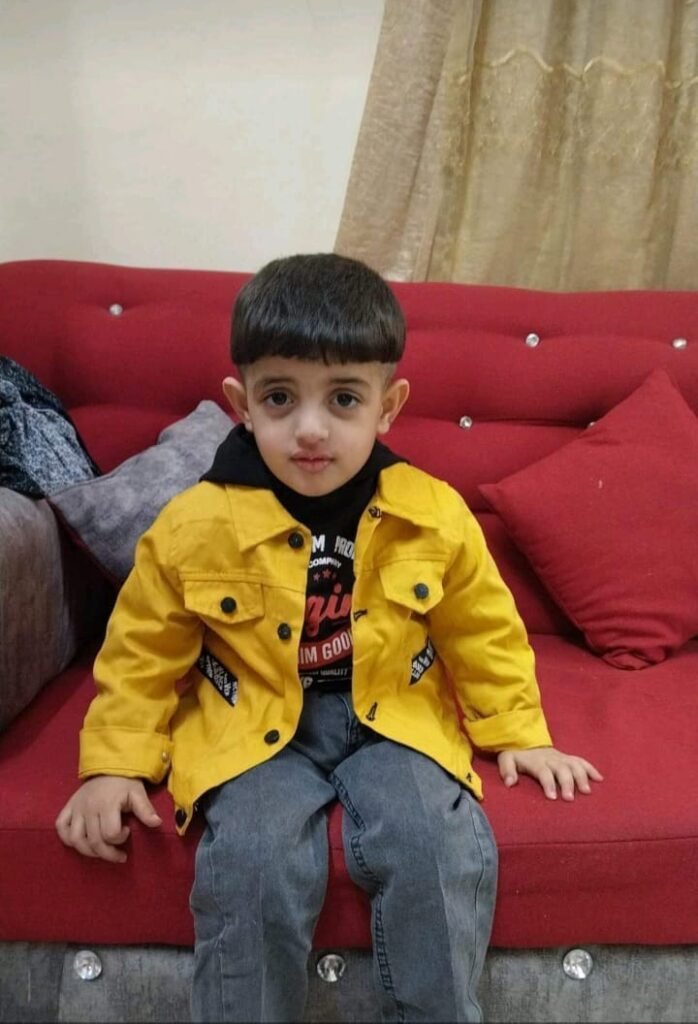
Since the attack, every dog has become that dog. “All the dogs outside — they’re the ones that bit me. All of them,” Ibrahim insists.
But the fear doesn’t end with daylight. “Two nights ago,” Amani recalls, “he woke me up screaming, ‘Mama, the dog is here… it’s right by my head!’ I tried to calm him down, told him it might’ve just been the kitten we brought home to help him heal. But he was certain — ‘No. It was a dog.’”
Desperate to restore a sense of safety, Amani brought home a kitten for her son to bond with. “I thought it might help him forget,” she says. “But not even a soft, purring animal could chase away the nightmare.”
What happened that day wasn’t just a physical wound — it was a rupture in the worldview of a child. The street no longer feels safe. Sleep offers no escape. And every attempt to return to normal childhood joys crashes against a wall of fear.
The Oketz Unit… History and Development
In 1939, the Oketz – “bite” in Hebrew – secret police and military canine unit, also known as Unit 7142, was established as part of the Haganah. But it was disbanded in 1954.
In 1974, following a series of attacks on Israel in the early 1970s, a new unit was set up at the Sirkin base (northwest of Kfar Sirkin, in central Israel). It started with just eleven recruits, but later expanded to include hundreds.
Up until 1988, Oketz operated in complete secrecy, but then became an overt element of Israeli military operations. Oketz relies almost entirely on military dogs imported from Europe, with 99 percent of those supplied by companies specialising in breeding these types of dogs. Breeds include the Belgian Malinois, alongside a smaller number of German Shepherds and British Labradors.
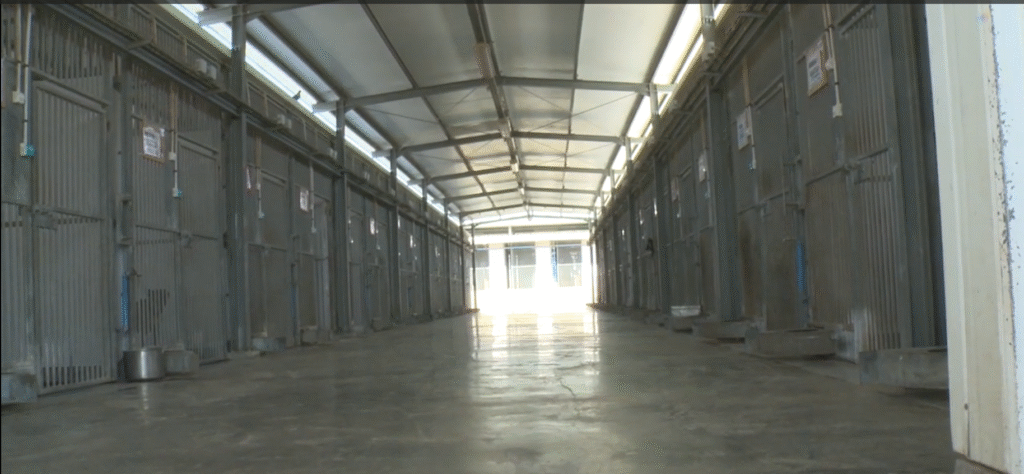
Of the approximately 300 soldiers who apply to join the Oketz Unit each year, only 25 are selected after passing rigorous tests. The unit is supported by non-governmental organizations in countries like the US, where funds are raised for the unit under the banner of “American Friends of Oketz”. This organisation is dedicated to building strong links, support, and solidarity between US society and the Oketz Unit. Also, the Oketz Foundation in Israel has a website that accepts donations for the unit.
Last year, commanders in the Oketz unit told US urban warfare researcher John Spencer, who has embedded with the IDF on multiple operations, that 99% of the approximately 70 military dogs it buys every year were sourced from companies in Europe, a figure that the IDF did not dispute when asked to confirm.
Oketz insists it only deploys attack dogs in anti-terrorism operations, but human rights organisations inside Gaza and the West Bank say the use of the animals to attack, terrorise, and humiliate Palestinian civilians has increased since the beginning of the war in Gaza, leading to multiple injuries and some fatalities.
One organisation, Euro Med Human Rights Monitor, says it has documented 146 cases of attack dogs being used against civilians by the Israeli army since October 2023.
Each young dog costs around US$10,000, or maybe more, according to the defence correspondent of Israeli Channel 12 TV.
The Israeli authorities put these dogs through an intensive two-year training programme, teaching them to perform multiple tasks. These include attacks during combat, detecting explosives, and uncovering tunnels.
The unit operates in small teams, each of which has a commander, a deputy commander, two dog handlers, each with two dogs. Soldiers serve three to four years in the unit. Each dog works for between six and eight years.
On January 3, 2025, Israeli military reports revealed that the unit has lost 42 military dogs since the beginning of the war in Gaza. This confirmed how extensively these dogs are used in combat operations, regardless of how dangerous the situation is or how serious the losses incurred. By comparison, only three dogs were killed during Operation Cast Lead in the Gaza Strip in January 2009.
Dogs as a weapon of war: a legacy of oppression extends to Palestine
Dr Tarsis Brito, a postdoctoral fellow at the London School of Economics, points to similarities between the use of military dogs in Israel and colonial practices in the past: “For centuries, police dogs have been used as a weapon to enforce colonial power, from the Americas to suppression of slave revolts in Haiti. Today this grim legacy continues in Palestine, where these dogs are used to both dominate and dehumanise.”
He explains the psychological dimension of using dogs in this context by saying that the fear of being attacked by a dog evokes deep instinctive fears of predation, a strategy used by ‘doggers’ to spread terror and reinforce submission.
Belgian Malinois: The favourite breed of the Oketz Unit
The Oketz Unit favours the Belgian Malinois over other breeds, like German Shepherds and Rottweilers, because of its superior performance in the field. Originally bred in Belgium as sheepdogs, Malinois have proven themselves in many military and security roles.

Belgian Malinois
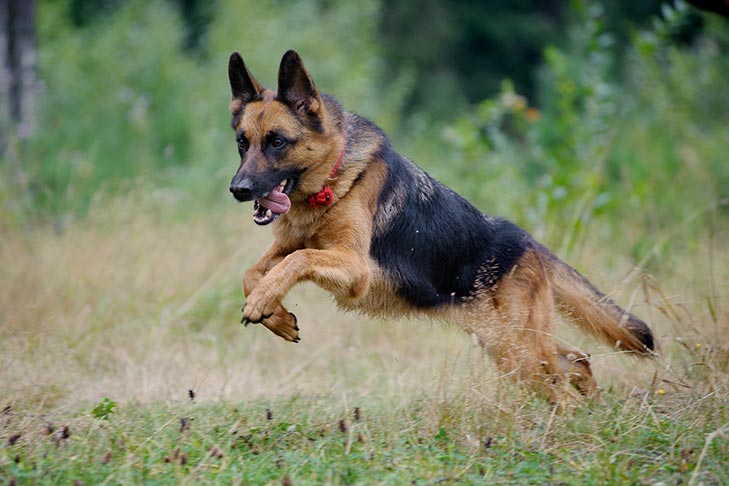
German Shepherd

Rottweiler

Canaan Dog
Yedioth Ahronoth newspaper reported on January 31, 2024, the start of a major operation by the Israeli Ministry of Defence to purchase trained dogs from Europe, to make up for the failure of Oketz Unit dogs to perform adequately in the Gaza War.
The paper reported that the director of procurement in the Israeli defence ministry had ordered dogs, especially the Malinois breed, to be bought from the Netherlands and Germany with the process set to begin in coming months.
Israel does not differentiate

On July 30, 2024, Israeli tanks surrounded the Bohar family’s home in Gaza’s Shuja’iyya neighbourhood as part of a military incursion. This humble family lived in terror for days. On the seventh day, Israeli forces stormed the house and set loose two military dogs, which had in theory been trained. But the raid ended with 25-year-old Mohamed Bohar, who suffered from Down syndrome, killed by the teeth and claws of one of the military dogs.
Nabila Bohar speaks about the death of her son, Mohamed, in a low voice full of both sadness and anger. Her late son could not speak normally and, because of his condition, was unable to understand what was going on around him as others could.
“The soldiers broke into the house like madmen, like savages,” she says. “There were even quadcopters that came into the kitchen, and they brought a military dog with them into the living room. It attacked Mohamed and bit him in the chest… It was a huge dog, brown and black. It was like a ravenous wolf. It started mauling my son horrifically and wouldn’t stop.”
She says that the dog clamped its jaws round Mohamed’s hand and started trying to pull his arm away from his shoulder. Despite his disability, he tried to defend himself and managed to shout a few indistinct words to the dog: “No, no …go away,” but the dog would not stop, and just kept biting him violently.
Mohamed’s mother, weeping and overcome with sorrow, describes how her son stroked the dog, saying: “Enough, enough, my dear.” But even after he had collapsed unconscious, the dog continued mauling his arm, which was bleeding profusely.

According to Nabila, the soldiers stood by, indifferent to her pleading for them to save him. “I want to help my son… my son is bleeding to death,” she screamed. The soldiers claimed they brought a military doctor to treat him, but they did not allow her to see him.
“I could hear Mohamed’s voice calling for water,” says Nabila, “I asked the soldiers to let him drink, but they didn’t want to, and they pushed the bottle away. I felt that would be the end of him, and when I saw the soldier pointing, I knew my son had been martyred.”
A few minutes later, the soldiers came out and told her that her son had died.
A night of terror in Jenin
As dawn broke on Monday July 3 2023, Fatima Saleh, 58, a resident of the Jenin refugee camp (which lies within the municipal boundaries of Jenin and is the northernmost camp in the West Bank) was brutally attacked in her home by a trained dog, which Israeli forces had unleashed during a raid.
Fatima recounts in detail how the attack began: “It was huge and black…it rushed towards me and before I could move, it seized my right hand, clamping its jaws with incredible force. I screamed for help, but the soldiers just stood there laughing; they didn’t care.”
The attack went on with the dog biting her repeatedly, as she tried in vain to free her hand from its jaws. She begged the soldiers to intervene as the pain and bleeding became worse. But, in what she calls a shocking reaction, they just let the dog go on tearing the flesh off her hand as she continued to bleed.
The attack on Fatima went on for more than 15 minutes, with her screaming for help. The soldiers treated it all with an indifference that in itself demonstrates a systematic pattern of oppression, designed to terrorise and subjugate Palestinian civilians.
Fatima describes what happened next: “After 15 minutes, one of the soldiers tried to pull the dog away, but it pushed him so hard he fell over. Then another soldier with a knife came up screaming, and I thought he was going to cut off my hand. But he couldn’t get the dog off me. After twenty minutes of it biting, and me bleeding and screaming, a third soldier finally managed to get the dog off my hand.”
The Canine That Attacked Me
In one of the eastern neighbourhoods of Gaza, where the walls of the dilapidated houses speak of fear, Hajj Omar Youssef, a man in his seventies, sits and recounts what happened to him as if he had survived a horrific storm. This was no ordinary arrest or raid. He describes it as “being hunted, physically and psychologically, by a trained military dog.”
Hajj Omar recounts the details of the attack, which is etched in his memory: ” I was sitting on the roof of my half-destroyed house, when a tank appeared from the direction of the workshop just nearby… it was going at breakneck speed. Behind the house, it turned round. I tried to get down, but was surprised to see soldiers creeping in from the back…. They came in all at once, a whole unit … six men.”
They immediately unleashed a huge dog with a camera mounted on its head. They shouted to the dog in Hebrew: “Tbitou”, meaning “seize him,” and then stood and watched what happened on a hand-held screen one of them had.
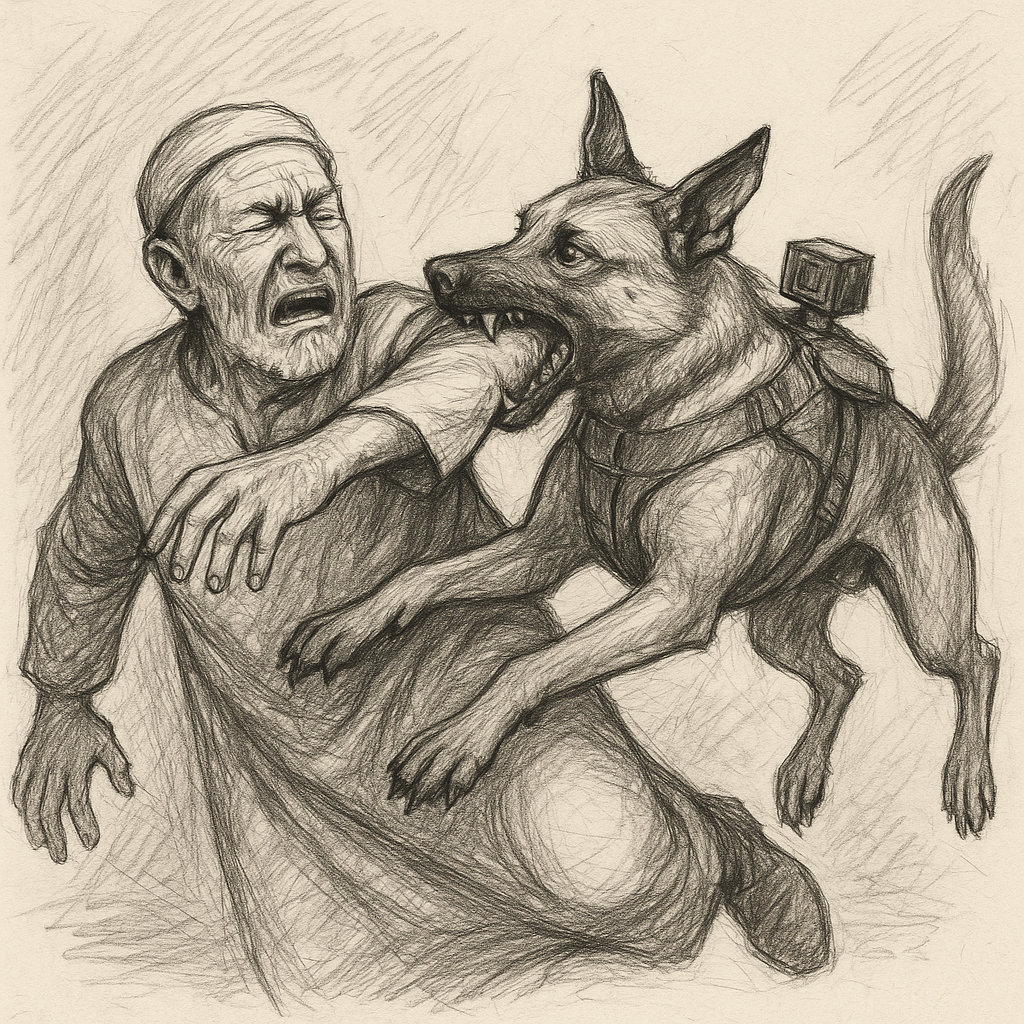
The dog attack
The huge dog went for the 70-year-old man, biting him in the arm and ripping his clothes. It attacked Hajj Omar’s arm with such force that its teeth sank to the bone. Omar describes the soldiers’ reaction: “I screamed, ‘Guys, guys, the dog’s biting me! Help!’ But they didn’t care.”
The dog did not just bite; it dragged Omar from the third floor down to the ground floor, where an Israeli officer was waiting.
Hajj Omar adds: ‘The trainer grabbed the dog, put it between his legs and gave it a treat as a reward, as if to tell it, ‘You caught a lion, not a person.’ They didn’t seem to understand that they had just hunted down a human.’
Bleeding profusely, Omar was forced into his kitchen where the soldiers ordered him to undress completely. When he pleaded for help with the pain and heavy bleeding, they did nothing. “I said I needed a doctor, that I was bleeding, but the officer replied, ‘Hang on, we’ll take you in a while.’ It was clear all they were interested in was that the dog had fulfilled its mission.”
After that, he was dragged from house to house through holes in the walls. Hajj Omar describes that night like this: “I went from my house to my neighbour’s house, then to a third house…all night long. I was screaming with pain.”
Omar went on bleeding till seven in the morning, without any first aid. Then finally, one of the soldiers handed him a white towel, saying, as if mocking him, “Here’s your towel of peace.”
A Night of Pain in Jabalia

In May 2024, 69-year-old Dawlat Abdullah al-Tanani was viciously attacked by a police dog unleashed by Israeli forces inside her home in the Jabalia refugee camp in the Gaza Strip.
Her testimony – supported by a video which went viral, shot from a camera mounted on the back of the dog involved in the attack – provides compelling evidence of the brutality of using animals as instruments of intimidation.
Throughout the Israeli incursion into Jabalia, Dawlat al-Tanani refused to leave her home, despite heavy shelling of the area. Her neighbour, cousin, and son were with her in the house.
At 10 pm, Israeli forces stormed the house. Moments later, a police dog burst into the room where Dawlat was lying in bed.
She describes what happened: “The dog sank its teeth into my shoulder and arm, and I felt them tearing my flesh down to the bone. I screamed and yelled as hard as I could when I felt my hand go.”
Her relative Jabr, who was there in the house, tried to save her, even though he had had metal plates in his leg from a previous injury. He hit the dog with his crutches to try and make it stop, but it was ferocious and kept up the attack.
Even though she was bleeding profusely and despite the pleas of her family, Dawlat al-Tanani received no medical help. “Since that time, I haven’t been able to lift my hands,” she says.

In another incident in the Manara neighbourhood of Khan Younis in the Gaza Strip, Tahrir Husni al-Arian, 34, was expecting her first child after years of waiting. Tahrir recalls the horror when soldiers broke into her home and a police dog with them bolted in and attacked her. It sank its fangs into her leg for ten whole minutes. As she screamed in pain and pleaded for help, the soldiers themselves tried three times to get the dog off her, but in vain. Finally, after ten minutes of terror, the dog let go.
Tahrir says: “When it was attacking me, I lost all feeling in my leg. I didn’t know if I was bleeding or if the dog was tearing my flesh. When it was over, I sat down on the couch, and then I could see my blood and flesh all over the floor.”
Because of the dog bites, Tahrir developed serious complications that caused her to miscarry. Choking back the tears, she says: “I lost the child I’d waited six years for.”
Tahrir describes how big and savage the dog was. “This was a dog in name only. It was so tall and broad; it was impossible to push or kick it away. You’d have needed a crane to get it off me.”
Dr Richard Falk, former UN Special Rapporteur on the Palestinian Territories, highlights Israel’s misuse of police and military dogs against Palestinians, describing this as a gross violation of international law and a “clear breach of the Fourth Geneva Convention, which is based on the fundamental principle of protecting the civilian population.”
Falk points out that the systematic use of attack dogs is part of a broader Israeli strategy to dehumanise Palestinians. “Employing such tactics to terrorise the civilian population is an extremely grave abuse. It has been used for years, not only since the genocide in Gaza, but from the time Israeli settlements were built in the occupied territories.”
“The roots of this tactic go back to the 1940s, when the Zionist militias of the time were closely involved in using trained dogs as a weapon of war and as a tool to repress a community under occupation.”
Amnesty International guidelines emphasize that the use of police dogs is highly dangerous and usually counterproductive. They state that “once dogs are unleashed, without restraints or muzzles, they are almost impossible to control.” Amnesty urges extreme caution when considering using dogs, warning that they can injure people who are posing no threat.
International complicity: The Western Role in Enabling Violence
Sarah Leah Whitson, executive director of Democracy for the Arab World Now (DAWN), is also firm in her position regarding the legality of using police dogs in the Occupied Territories: “The rules are the same, whether the weapon is an attack dog, a drone, or a missile; international humanitarian law prohibits the use of military force against civilians,” she says.
“There is no difference between an attack dog and a missile. Targeting civilians is banned internationally.” Sarah Leah Whitson
In the West Bank, the Palestinian human rights organisation Al-Haq has also documented 18 cases of military dog attacks on civilians since October 2023, including children.
The increasing use of military and police dogs as tools of repression against Palestinians raises fundamental questions over the role of Western companies in the export to Israel of these dogs, and whether this makes them complicit in gross violations of human rights.
Patrick Wilcken, Amnesty International’s researcher on military and security affairs, raises serious concerns over the responsibility borne by countries exporting these dogs. He insists that they have a legal and moral obligation to ensure that their products are not used in contravention of human rights.
Wilcken points to the close similarity between laws on commercial arms exports and ethical standards governing the export of police dogs. If dogs are used to injure or threaten individuals, then exporting countries and companies are obliged to take measures to mitigate the risks, under the UN Guiding Principles on Business and Human Rights.
Wilcken adds that companies and states that license these exports may be held legally responsible for supporting the Israeli occupation, which is deemed illegal under international law. There is a clear risk that these exports help to promote practices that violate international and human rights law, so companies and states should seriously consider whether their activities are linked to unlawful acts committed by Israel.
Sarah Leah Whitson, executive director of DAWN, explains the legal and ethical dimensions of exporting trained dogs to Israel. She states plainly that “if exporters are aware that these dogs are being used in violation of international law, they are complicit.” But she says the issue is broader than simply the export of dogs: “Dogs are only a small part of what’s going on. Billions of dollars’ worth of weapons are being sent to Israel, enabling it to commit war crimes in Gaza and the West Bank.”
Taking advantage of right to information legislation, we contacted the governments of Belgium, the Netherlands, Germany, the Czech Republic, and Britain and asked them to provide us with records of exports to Israel of live animals classified as working or military dogs between 2008-2024. We also requested names of the parties involved and information on export licenses and permits; records of discussions and restrictions relating to human rights considerations, and any internal communications or documents related to compliance practices or ethical concerns. Our requests were met, however, with evasiveness and denial that such exports to Israel had taken place.
The Animal and Plant Health Agency has confirmed 294 dogs were exported from the UK to Israel as pets between February 2022 and December 2024, but says it does not track their breed or purpose.
Belgium’s Federal Agency for the Safety of the Food Chain (FASFC) responded by saying: “We regret to inform you that we are unable to send you this information.” We got back to FASFC asking them about the number of dogs exported between October 2023 to May 2025, but they replied saying: “We have investigated your new request thoroughly and have concluded that we must reject it, given that collecting the requested documents would again take an unreasonable amount of time. We estimate that this would require approximately 10 employees who would be prevented from executing their main tasks.
Other countries, such as the Czech Republic, that export dogs to Israel also say they do not have details on what breeds were sent or whether they were trained as military animals.
We asked the Ministry of Industry and Trade of the Czech Republic for data on the export of police dogs to Israel between 2008-2024, and they told us to ask the Ministry of Agriculture. We then wrote to the Czech Agriculture and Food Inspection Authority, but we have yet to receive any response. We also contacted the State Veterinary Administration to ask them for the number of veterinary certificates issued for dogs exported to Israel over the past years, but we have received no response.
The Czech Ministry of the Interior, meanwhile, denied that any police dogs had been exported to Israel: “We have to inform you that your information is untrue! It is strictly forbidden to export police dogs to any country. This is impossible. Any claim to the contrary is completely false.”
We also contacted the German customs authority and they told us: “The customs does not have any specific export statistics on this, and we would ask that you understand that, for data protection reasons, we cannot provide details of each individual customs case.”
Germany’s Federal Ministry of Food and Agriculture told us: “We do not have any information on this subject.” The Federal Ministry of the Interior and Society (BMI) also responded, saying: “We have no information on the export of police or military dogs from Germany to Israel or on parties involved. Accordingly, there is no information available on how these dogs are used in Israel. And nor do we have any internal reports or information on the matter.” On the question of the possibility of dogs being exported to Israel, we were referred to the German defence ministry, which replied: “The Ministry of the Interior has already provided you with a response.”
In an official response to our inquiries, Engelbert Uphues, owner of the German company Diensthunde.eu, confirmed that his firm had exported Belgian Malinois and German Shepherd dogs to Israel. He emphasized that his company’s role is limited strictly to training and exporting dogs for explosives and narcotics detection only, excluding any training or sale of dogs for protection or offensive purposes. Uphues stated that between 2020 and 2024, his company supplied a limited number of trained dogs to Israeli institutions or affiliated parties through authorized intermediaries and in full compliance with German laws.
Uphues also denied having any direct contracts with the Israeli Ministry of Defence or police, and noted that no government directive had been issued to halt exports. He further clarified that the company does not retain control over the dogs’ usage post-export but upholds the principle of animal welfare. “Our dogs are not trained for attack or law enforcement duties,” he asserted, “so we believe our work is unrelated to the allegations concerning the use of our dogs in any harm caused to civilians.”
We also asked the European Commission’s Directorate General for Trade to provide us with data on police dog exports from EU countries, but they responded by saying, “There are no documents that meet your request.”
As reports have mounted of attack dogs being used against Palestinians, Dr Richard Falk, the former UN Special Rapporteur on the Palestinian Territories, has sharply criticised Western countries supplying Israel with these trained dogs.
“From the perspective of general international law, I have no doubt whatever that companies exporting these dogs are complicit, because they know exactly how they are used. There is a lot of information showing that the Netherlands is involved in this practice, by training these dogs and then selling them to Israel,” says Falk.
Dutch companies at the centre of the scandal
Dr Falk highlights in particular Dutch companies like Four Winds K9, which has faced widespread protests over its role in exporting attack dogs to Israel. “This company indirectly admitted responsibility when it reached a financial settlement (11,000 euros) with a Palestinian victim of a police dog attack (Hamzeh Hashim, who was 16 at the time of the attack in 2015). They tried to make out this was a gesture of goodwill rather than a legal obligation, but this is not a defence in law. The settlement is evidence of knowledge and complicity,” Falk argues.
Despite the Dutch company’s attempts to conceal its ties to Israel, evidence reveals a long-standing partnership with the Israeli military. This is evident in a letter sent by the company in 2017 to the Israeli Ministry of Defence concerning the case of Hamzeh Hashem, which stated: “Based on our relationship spanning nearly 25 years, we hope and expect your government will provide the necessary support to resolve this issue.”
Additionally, Tony Boeyen, owner of Four Winds K9, disclosed that his company had supplied Israel with dozens of trained dogs for over 23 years, according to a report published by the Dutch newspaper NRC in 2015.
Former Dutch member of parliament for the D66 party Wassila Hachchi emphasizes the risks in using these dogs: “People make light of the way these dogs are used. But they’re a weapon. They’re trained to attack, and the damage they inflict, both physical and psychological, is very severe.”
Hachchi first raised this issue in the Dutch parliament in October 2015, after receiving information from human rights organizations that Dutch companies were exporting police dogs to Israel: “I got no clear answers. Then, months later, I received a written response from the minister. A long bureaucratic letter that didn’t get to the heart of the matter. And that says it all.”
On January 25, 2025, we asked the Dutch customs service to tell us how many police dogs had been exported from the Netherlands to Israel from 2010 to 2024. But on February 5, 2025, they replied, saying there were no exports listed for “military” or “police” dogs, but rather for “live animals”, under the code number 01061900.
The customs service added: ” We are generally unable to provide you with details of exporters and importers because of strict confidentiality regulations. We cannot comment on individual cases or share either names or addresses, or details of approved licenses or permits. Moreover, permits and licences are not required for the export of dogs, including working dogs. Neither are dogs included on the EU Common Military List or the EU Common Dual Use List. They are therefore not classified as strategic items requiring a permit or license.”
We received the same response from the Dutch Ministry of Foreign Trade and Development Cooperation. It said that, although steps had previously been taken to see if it was possible to classify dogs as controlled substances, this would require international agreements, which have yet to be put in place.
The Dutch Centre for Research on Multinational Corporations think tank (SOMO) nevertheless managed to obtain information from the Netherlands Food and Consumer Product Safety Authority (NVWA) showing the extent of police and military dog exports to Israel between October 2023 and February 2025. During this period, the NVWA issued a total of 110 veterinary certificates, the documents required for the export of dogs to Israel by Dutch companies specialising in military and police canine training.
The lion’s share of these certificates, 100 of them, went to Four Winds K9. Police Dogs Centre Holland received four certificates, while another six went to K10 Working Dogs. These numbers reveal the continued and expanding cooperation between the Dutch security sector and the Israeli military.
We analyzed the financial statements of Four Winds K9 BV, which were registered with the Netherlands Chamber of Commerce in 2017, and found that the company’s financial assets had grown steadily over the past seven years. But while examining the data, we also found worrying and mysterious indicators on both the operational and financial fronts. The company’s total assets rose from €473,173 in 2017 to €2.18 million in 2023 – a nearly fivefold increase. However, its financial statements showed unexplained increases in money owed to the company, particularly for the period 2022 – 2023 (from €592,692 to €750,626). The sharp rise in short-term liabilities, combined with a drop in liquidity in 2023, suggests serious pressures on cash flow. Together, these indicators call for an in-depth investigation not only of Four Winds K9’s financial practices, but also of its international operations associated with the transporting of dogs to controversial destinations, including Israel.
The company’s website also shows that it has expanded its operations beyond Europe. It registered another company in Nigeria under the name United Winds K9 Nigeria and, in 2015, established a branch in the Kurdistan Region of Iraq called United K9 Kurdistan. The surprising thing is that contact numbers in the UAE are listed alongside the Dutch numbers. The company registered a branch in the UAE in 2018 as Four Winds DiagNose K9 (Four Winds DiagNose K9 Solutions LLC), revealing the expansion of its operations into the Middle East.
We reached out to Four Winds K9, but up to the date this report is published, we have received no response. We also wrote to both Police Dogs Centre Holland and K10 Working Dogs asking for them to comment on the dispatch of police dogs to the Israeli military, but up to the publication date of this report, we have received no response.
On September 11 2024, MP Christine Teunissen (of the animal protection party PvdD) submitted a request to question the Dutch defence minister over the export of combat dogs by Dutch companies to the Israeli military, citing documented incidents that had taken place in Gaza, including the killing of Down syndrome sufferer Mohamed Bohar and the attack on Dawlat al-Tanani by Israeli military dogs.
On 4 October 2024, Dutch Minister of Foreign Trade and Development Reinette Klever responded by acknowledging she was aware of these incidents, but she avoided linking the dogs involved to those exported from the Netherlands. She pointed out that trained dogs are not classified as strategic or controlled dual-use items under EU regulations.
In an interview, Dutch MP Christine Tounsen (of the Party for the Animals, PvdD) told us that exported dogs are not legally classified as weapons or dual-use products, but as pets, which allows them to be exported without any real oversight. She added: “When we start treating these dogs as weapons, the law will change automatically… The fact that we continue to classify them as pets makes us complicit in war crimes.”
The MP pointed out that Dutch law strictly controls the export of weapons, and questioned why these dogs were not treated with the same seriousness.
Comparing the way the West treats crimes in Ukraine and Palestine, Tounsen criticised its double standards: “There is a contradiction between the position Europe has taken towards Putin’s crimes and those of Netanyahu… How can the Netherlands, which is home to the International Criminal Court and the International Court of Justice, turn a blind eye to its role in these legal abuses? It’s shameful.”
EU and Legal Responsibility

Although European companies and officials try to deny or conceal the export of police dogs to Israel, Sarah Leah Whitson argues that EU officials could be held accountable: “European officials who help Israel to commit war crimes and violations of the Rome Statute could find themselves prosecuted by the International Criminal Court (ICC) on charges of complicity with the commission of crimes.”
A never-ending cycle of violence
The “Israeli system” of unleashing vicious, unmuzzled dogs on Palestinian civilians during invasions of their homes has been heavily criticised, as has the apathy shown towards the dogs’ behaviour, or perhaps the deliberate training of dogs to viciously attack their victims.
Canine behaviour expert Alana Linsay Stevenson says some training programs use harsh methods such as “helicoptering,” which involves the dog being choked into submission. She explains: “Some training methods make dogs associate pain with fear. Physical punishment is used as a threat to make them obey commands. It’s a training based on control, not compassion.”
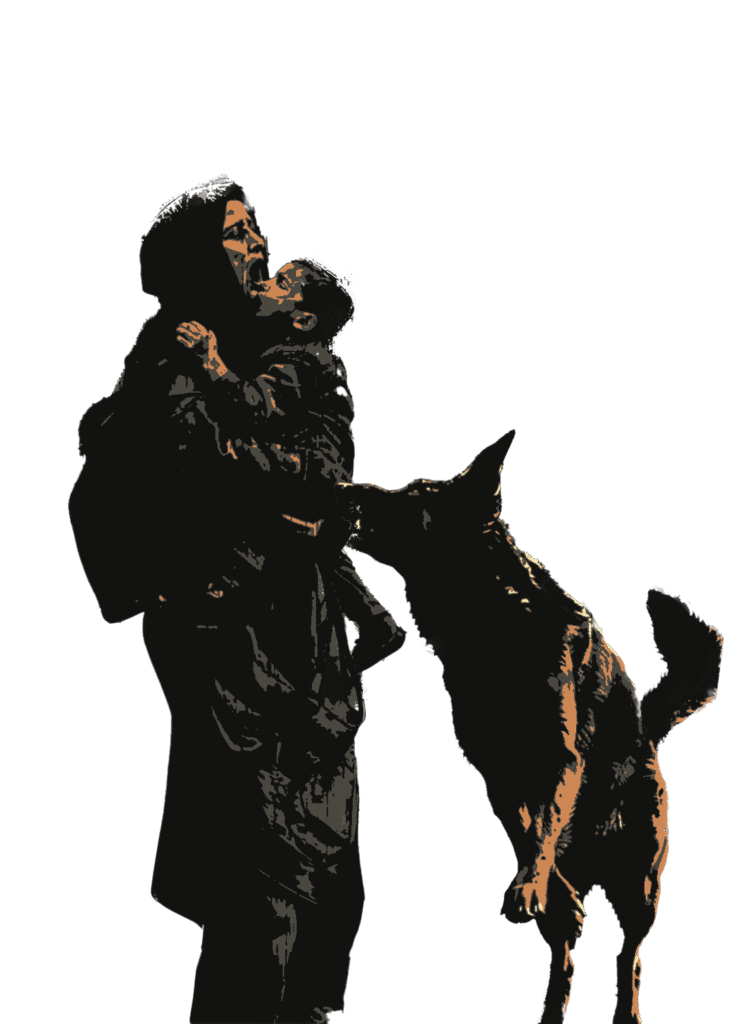
A survey of 303 Belgian military dog trainers in 2008 found that harsh training methods were not as effective as positive reinforcement and could even pose a threat to the dogs’ well-being. The survey showed that the most commonly used punishment methods were pulling on the collar and using choke chains to control dogs – practices used to dominate dogs rather than build trust.
“Once a dog learns that aggression leads to reward,” says Alana Stevenson, “it can’t stop the behaviour. It becomes trapped in a closed loop that can only be broken by completely removing it from the environment that reinforces this pattern of behaviour.
Laws not enforced
As in the case of Israel’s widespread use of police dogs in the Palestinian territories, the deployment of police and military dogs in conflict zones raises serious questions about gaps in international law and enforcement mechanisms. Despite international treaties, such as the Arms Trade Treaty (ATT), and EU regulations that prohibit the export of any equipment or item to be used in violation of human rights, the reality is that these laws are not being properly enforced.
Although the EU imposes clear restrictions on the export of items for military use to countries guilty of serious rights violations, reports show that trained dogs continue to be exported to Israel by European companies, with no real accountability.
EU laws
Amnesty International researcher Patrick Wilcken says these laws are strong on paper, but their implementation is woefully inadequate. Companies and governments, therefore, must ensure strict compliance so that they are not complicit in such abuses.
“The exporting State Party shall also consider whether there are measures that can be taken to mitigate the risks identified in (a) or (b) of paragraph 1, such as confidence-building measures or programs jointly developed and agreed upon by exporting and importing States.” Article 7, paragraph 2 of the Arms Trade Treaty.
We contacted the European Commission, the European Parliament’s Human Rights Committee, and the European External Action Service (EEAS) for comment on the exporting of European dogs to Israel and how they are used to carry out abuses, but we have received no response as of the date of publication of this report.
UN Special Rapporteur on Torture Alice Jill Edwards, in her August 24, 2023, report, called for the prohibition of some items used in human rights abuses. But she made no reference to military or police dogs.
When we contacted her for comment on this legal oversight, Edwards asked for documentary evidence that dogs were used in attacks on Palestinians. She also expressed an interest in seeing this investigation once it was published to consider if it could be used to hold Israel to account.
Patrick Wilckin proposes expanding current legal frameworks to explicitly cover military dogs. “While conventional weapons are tightly regulated, instruments of law enforcement – like dogs – are still not subject to strict oversight. They should be part of international treaties regulating their use, to stop them being used in violation of human rights,” he said.
In a statement, the Israeli military said, “The IDF, including the Oketz unit, employs all necessary operational tools required to address threats in the field – this is conducted in accordance with binding orders, operational ethics, and international law. The IDF does not use dogs for punitive purposes or to harm civilians. All use of dogs is based solely on clear operational necessity, under close supervision, and following comprehensive training for both fighters and dogs alike.”
The IDF said that it places “great importance on the well-being of the operational dogs, who are an integral part of the combat apparatus – and the unit continues to operate with constant efforts to minimise harm to all components of the force, including its dogs.”
Palestinian homes can no longer protect their residents from the fangs of trained police dogs. International law has failed to prevent these “rapacious” dogs from tearing apart the bodies of Palestinians inside their homes, which are now under siege and have turned into detention centres.
Additional reporting by Aziza Nofal (West Bank) and Zarifa Hassan (Gaza).
This investigation was supported by ARIJ.



